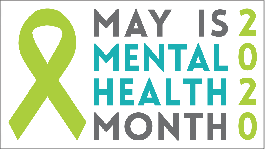Prioritizing Mental Wellness During Mental Health Month
While it is commonly known by those in our profession that May is Better Speech and Hearing Month, May is also dedicated to increasing awareness of an equally important issue: mental health awareness.
Mental health is essential to everyone’s overall health and wellbeing; while 1 in 5 people will experience a mental illness during their lifetime, 5 in 5 people will face challenges in life that can impact their mental health.
During a typical school year, we often find ourselves juggling a heavy caseload, never-ending paperwork, ARDs and parent meetings, all in addition to balancing our personal lives and overall wellness. Now that many of us have shifted to working from home amidst the covid-19 pandemic, we are faced with new challenges: transitioning to tele-therapy, creating a productive work environment at home, helping our own children with distance learning, dealing with general uncertainty about the future, and adjusting to a new “normal”. While mental health can be about an individual seeking diagnosis or treatment for a mental illness, every one of us should find a way to prioritize our mental health during this time of increased stress and uncertainty.
Self-care can look very different from person to person, but it is rooted in the idea that in order for us to care for those around us and avoid burnout, we must commit to meeting our own needs first. Burnout is a common phenomenon experienced by school professionals, and occurs due to prolonged stress and feeling overwhelmed by all of the demands of your life. Here are a few ways to incorporate self-care in your daily life and thus improve your overall mental wellbeing:
- Create a comfortable and private (if possible) workspace that is separate from where you sleep. Add a candle, knick-knacks, or picture frames to make it feel like a cozy office space.
- Schedule time to recharge: try setting aside just 10-15 minutes per day solely for self-care. Set a reminder on your phone or an event on your calendar so that you don’t get too busy and forget. This can be stretching, doodling, engaging in a hobby, eating a meal sitting down instead of while working, or allowing yourself a few minutes of quiet, alone time. Whatever helps you feel a little re-energized!
- If you have back-to-back meetings or tele-sessions, set aside just 60 seconds in between them and focus on breathing in and out, slowly and deeply.
- Turn off your email notifications when you are done working, and try to limit your news and social media intake.
- Eat healthy when you can to keep your immune system strong; however, allow yourself to enjoy foods where the only real nourishment is comfort! My go-to comfort food is chips and queso.
This list is just to get ideas brewing, do what feels right for you! If you suspect that you are suffering from more than stress or burnout, Mental Health America (MHA)offers a range of free screening tools at https://screening.mhanational.org/screening-tools. You can find all kinds of resources about self-care and mental wellness on the MHA website, along with National Alliance on Mental Health, Centers for Disease Control and Prevention, Anxiety and Depression Association of America, and many, many more with a Google search. Remember to be kind to yourself during these challenging times. Just a few minutes of self-care per day can go a long way! Happy Mental Health Awareness Month!
Sources:
https://www.mhanational.org
https://www.mhanational.org/mental-health-month
https://www.nami.org/home
https://www.cdc.gov/coronavirus/2019-ncov/daily-life-coping/managing-stress-anxiety.html?CDC_AA_refVal=https%3A%2F%2Fwww.cdc.gov%2Fcoronavirus%2F2019-ncov%2Fprepare%2Fmanaging-stress-anxiety.html
Author: Grace Richardson, MS, CCC-SLP

